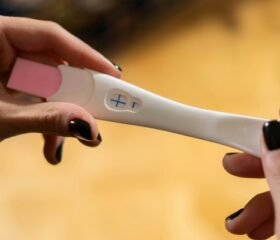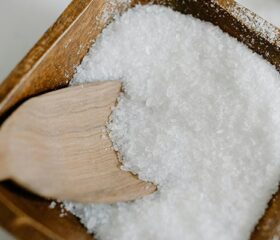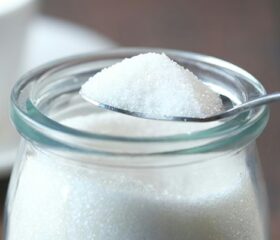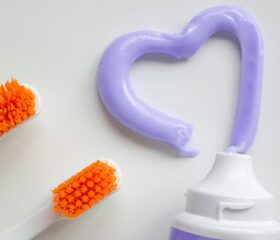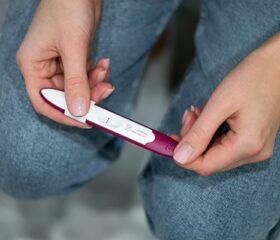The DIY Bleach Pregnancy Test: Does It Really Work?
Are you getting those early signs that you may have a passenger on board? If so, you probably want to take a test to confirm your suspicions—and if, for some reason, you’d prefer not to buy a typical drug store testing kit, you may be looking for DIY alternatives.
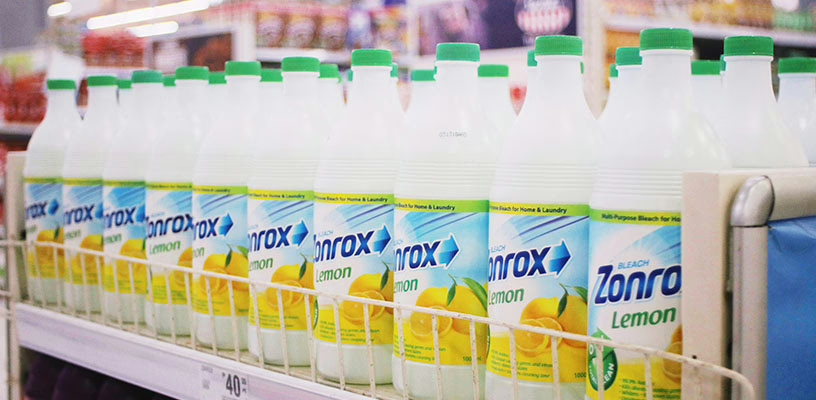
A quick search for “DIY pregnancy tests” will reveal a plethora of questionable methods, one of which is the bleach pregnancy test. If you’re thinking that bleach and pregnancy don’t sound like two things that should go together, you’re right.
Let’s look at what exactly a bleach pregnancy test is and why you may want to think twice before you go sifting through your cleaning products.
What is the bleach pregnancy test and how does it work?
This (purported) method of detecting pregnancy using bleach is simple: you mix your morning pee with household bleach and observe the results. If the mixture becomes foamy, you’re supposed to be pregnant. If not, it means the test is negative.
Advocates of the bleach pregnancy test claim that bleach reacts with your human chorionic gonadotropin (hCG) hormone, which you produce when you’re pregnant. Like with regular home pregnancy tests, you’re supposed to use your first pee of the morning, as it usually has the highest concentration of hCG. 1
Is the bleach pregnancy test legit?
To put it bluntly, no, the bleach pregnancy test isn’t legit. It doesn’t actually work.
There’s no scientific evidence to support the claim that bleach reacts with hCG or has any power at all to tell if you’re pregnant. 2
What’s more, unlike other DIY tests, such as the salt, sugar, and toothpaste pregnancy tests (none of which work, either), the bleach pregnancy test can actively be dangerous.
Why you should avoid this test
In general, DIY pregnancy testing methods are dangerous because they can trick you into thinking that you aren’t pregnant when you are, or vice versa. This could lead you to make decisions that could harm you or your baby.
A false negative, for example, could cause you to skip out on getting important prenatal care, or to consume foods and drinks you should avoid during pregnancy.
Moreover, mixing bleach and urine isn’t safe. The ammonia in your urine will react with the bleach, creating chlorine gas, which is highly toxic. 3 This is particularly dangerous in small, poorly ventilated spaces (e.g, if you do this “test” in your bathroom).
In fact, if you’re pregnant, it’s generally better to avoid working with bleach at all—even if you aren’t mixing it with urine. Exposure to strong chemicals when you’re carrying a child can have harmful effects. 4 Exposure to chlorine bleach, in particular, has been linked to an increased incidence of stillbirths. 5
Why do some people believe this test works?
Despite the risks and the lack of evidence in support of the bleach pregnancy test, many people still believe in it.
Sometimes, of course, the “result” will be correct just through happenstance, leading people to claim on social media platforms that the test worked for them.
What’s more, the results can be ambiguous (it’s up for interpretation how much foaming you need for the result to be positive), so confirmation bias is also a factor. People are able to read the results in whatever way they want.
How to accurately test whether you’re pregnant
The one and only thing that proponents of the bleach pregnancy test get right is that you do have hCG in your urine when you’re pregnant. Your body starts producing this hormone as soon as you conceive. It becomes detectable in your urine right around the time you miss your period. 1
There are two (real) ways of testing for hCG:
Home pregnancy test kits
Standard pregnancy test kits detect hCG in your pee. Antibodies in the strips react to the hormone, which turns the line on the test (or whatever positive symbol it uses) a visible color.
Using a home pregnancy test kit is easy:
- Stick the test strip or stick under your urine stream (again, make sure to use your first pee of the morning). You can also pee in a clean cup and dip your test strip or stick into it. For best results, always check the manufacturer’s instructions on the best collection method.
- Following the instructions for the testing kit you are using, wait for several minutes and check the results.
Again, you can check if you’re pregnant as soon as you miss your period. These tests, if you use them correctly, are 99% accurate. 6
Is it possible for home pregnancy tests to be incorrect?
Although home pregnancy tests are very reliable, in rare cases, they return inaccurate results. This sometimes happens because the test was faulty, although it’s more likely that something else is the matter.
When pregnancy tests fail, it’s usually for one of these reasons:
- You took the test too early: In the early days of pregnancy, your hCG levels may be too low to be detectable on a home pregnancy test, which can lead you to think you’re not pregnant. 1
- Your urine was too diluted: If you took the test later in the day or you drank too much water, the hCG in your urine may be too diluted to determine whether you’re pregnant or not. 1
- You used the test incorrectly: If you didn’t read the instructions correctly (e.g., you peed in the wrong place or mistook a faint line on your pregnancy test for a negative result), you might not end up with accurate results.
To lower the chance of error, you could opt for a digital home pregnancy test, though they often come with a heftier price tag.
Pregnancy blood testing
The most reliable way to confirm whether you’re pregnant is to visit your OB or a clinic and ask for a blood test. This can detect hCG earlier in a pregnancy than a test using your urine.
Of course, this requires a visit to the doctor, so most women prefer to just wait a few days and use an at-home kit when they miss their period.
Final thoughts
Checking if you’re pregnant with bleach might seem like a cheap and quick solution, but it won’t work, and will needlessly expose you to a dangerous chemical that could potentially harm you—or your baby, if it turns out that you’re pregnant.
It’s better to leave your bleach in the pantry and use a real pregnancy test. These kits/tests are inexpensive, readily available, and backed by actual science.
Article Sources
- MedlinePlus. "Pregnancy Test" Retrieved May 5, 2025.
- Planned Parenthood. "Will the “bleach test” really tell me if I’m pregnant or not?" Retrieved May 5, 2025.
- Healthline. "Is It Safe to Pee in a Toilet That's Been Cleaned with Bleach?" Retrieved May 5, 2025.
- California Department of Public Health. "If I'm Pregnant, Can the Chemicals I Work With Harm My Baby?" Retrieved May 5, 2025.
- International Journal of Environmental Research and Public Health. "Association between Maternal Exposure to Chemicals during Pregnancy and the Risk of Foetal Death: The Japan Environment and Children’s Study" Retrieved May 5, 2025.
- Planned Parenthood. "Pregnancy Tests" Retrieved May 5, 2025.
